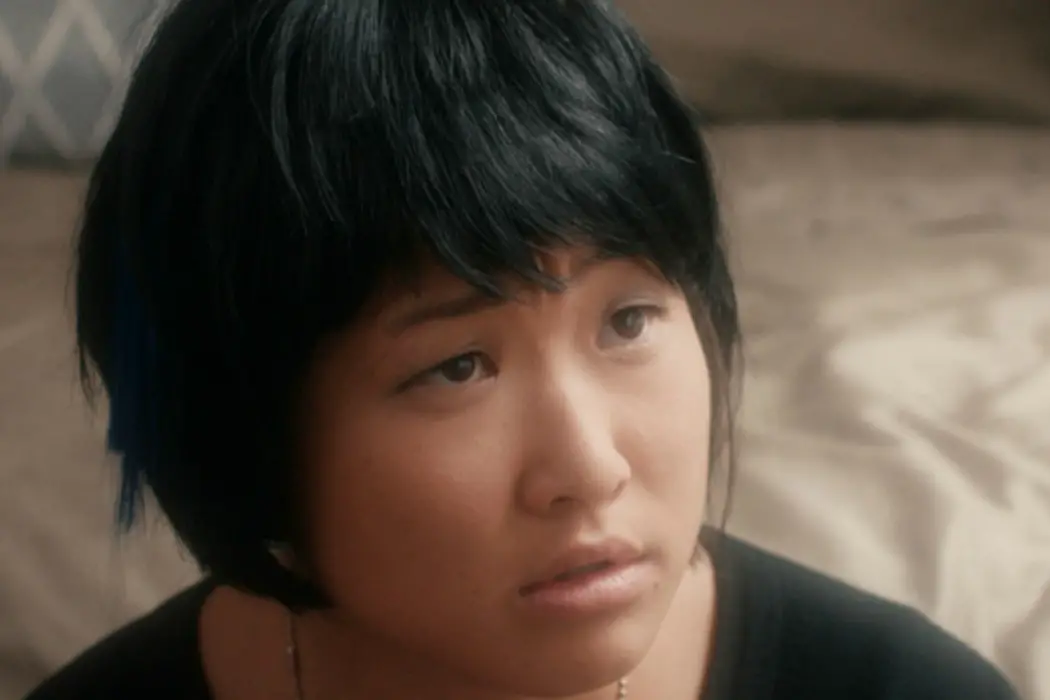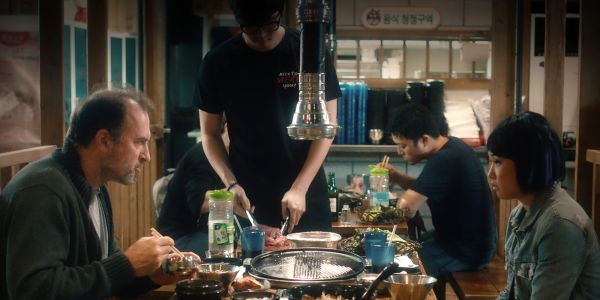YELLOW FEVER: Potentially Unique, But Ultimately Familiar

Joe George teaches English at the University of North Carolina…
In its first ten minutes, Kat Moon’s dramedy Yellow Fever announces itself as something unique, with a voice over listing the myriad ways people reduce the film’s Korean American protagonist to a stereotype. Equally uncomfortable with both white guys who find her exotic and with fellow Koreans who try to bond over Asian folk wisdom, Asia (Jenna Ushkowitz) struggles to establish her identity in a world that constantly tells her who she is. This world includes Asia’s white American adopted parents, who (as she puts it) “overdo it with the cultural heritage bullshit,” and thus remind her that she is different.
While this theme has been covered in literature, by writers such as Chang-rae Lee and Gish Jen, it’s a fantastic and uncommon premise for American cinema. One that recalls Justin Simien’s Dear White People or perhaps Raoul Peck’s I Am Not Your Negro, both of which describe the experience of African Americans, not Asian Americans. But despite this opening promise, Yellow Fever abandons an examination of Asian American identity in favor of bland white family dynamics.
Identity Crises
Yellow Fever’s best moment occurs within these opening ten minutes, with a mistaken identity gag: after ordering a hot dog from a Central Park vendor, Asia looks down to add condiments just as a woman with a thick Australian accent arrives to order the same. When the vendor asks the woman, “Where are you from?” an infuriated Asia snaps, “Just because I’m yellow, I have to be from somewhere else, right? Where the hell are you from? Iraq?”.

The joke works on a number of levels: it humanizes Asia, giving her some limited perspective to temper her adolescent snark, while still reminding viewers that she is subjected to ceaseless reminders of her difference. More importantly, the misunderstanding only persists for a minute, before easily resolving. Unfortunately, none of those attributes are carried through to the rest of the film. After setting up such an interesting premise, Yellow Fever puts the lion’s share of its attention on Asia’s family, a clichéd story about unhappy upper-middle class white people.
The movie follows the tension between her parents Michael and Li Bradford (played by Michael Lowry and Nahanni Johnstone), an unhappy couple who deal with their problems in a manner familiar to moviegoers: Michael appears to be pursuing an affair with another woman, while Li numbs herself with wine. Add to this Asia’s white little brother Taro (Matthew Miniero), whose penchant for masturbation has become legendary even among his fellow middle-school boys, and the recently divorced family friend John (Scott Patterson), and there’s little room for Moon’s script to develop Asia.
And this is a problem, because the family plot is as dull as Asia’s identity search is compelling. The white American experience has been overly-documented, and Yellow Fever finds nothing new to say on the subject. Repeatedly, the film adheres to standard affair plot points and returns to well-worn tropes. For instance, Li deals with an angry phone conversation with her absent husband by pouring a tall glass of wine, something we’ve all seen before.
Moments of Complexity
Asia gets a little more attention as part of John’s story, but even here the movie subordinates her arc to his. Moon writes John as a standard sad white guy character, looking forlorn and disheveled as he deals with both a recent divorce and a death in the family, but Patterson does bring depth and charm to the role. More importantly, he has good chemistry with Ushkowitz, giving her more to do with the character than simply sneer at other people. Their scenes together are fun and believable, particularly a karaoke sing-a-long John forces Asia to join.

However, the performances can only do so much with a script that holds characters to tired beats. In the same way that the karaoke scene recalls the May/December friendship in Sofia Coppola’s Lost in Translation, Asia’s gradual warming to John feels less organic and more like something that just happens in these types of stories.
By sticking to these common points, Yellow Fever misses the opportunity to perform the examination hinted at by its opening. Asia has firmly established her distaste for white Americans who embrace orientalism, so why would she befriend John, a white American who lived in Korea for some time? If she has no interest in her “heritage,” why does she ask John to teach her Korean?
To be sure, a rich character contradicts herself and makes irrational choices, but none of these decisions feel rooted in Asia as a three-dimensional person. Instead, they reveal plot mechanics that need a character to do certain things just to keep the conflict going.
Subversion in Stereotypes?
The conflict continues, until the film reaches its allotted running time and is solved with a simple conversation. The characters gather in a room and explain themselves, instantly erasing the obstacles they faced. Asia’s identity crisis closes in an equally perfunctory manner, which only frustrates the viewer who hoped to watch her develop a new sense of self, but was instead stuck with a rote affair plot.

That said, there may be something more complex at work here. After all, the opening foregrounds the problems with stereotypes, and then went on to provide its own. It moved from critiquing assumptions about Asian Americans before repeating clichés about middle-class white Americans and, as a middle-class white American, I found myself just as annoyed as Asia. Was this the movie’s goal all along? Even if this effect was intentional, it still performed the trick at the cost of telling the story of Asia navigating cultural assumptions, the story suggested by the opening and one which is missing from American movie screens.
If you’ve seen the film, tell me: did you find the movie’s use of stereotypes effective? Or did they diminish what could have been an interesting and unique story?
Yellow Fever opened February 15th, 2017 in the UK and is playing at film festivals across the US.
https://www.youtube.com/watch?v=XmAz4RPVCu4
Does content like this matter to you?
Become a Member and support film journalism. Unlock access to all of Film Inquiry`s great articles. Join a community of like-minded readers who are passionate about cinema - get access to our private members Network, give back to independent filmmakers, and more.
Joe George teaches English at the University of North Carolina at Greensboro. When not teaching about books, movies, and comics, he's writing about books, movies, and comics. He can be found at joewriteswords.com or @jageorgeii on Twitter, but he can never be found outdoors.













